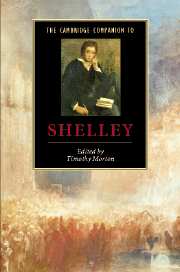7 - The political poet
from Part II - Works
Published online by Cambridge University Press: 28 January 2007
Summary
Intelligent idealism is closer to intelligent materialism than is unintelligent materialism.
(Lenin)Materialism and idealism
Prometheus Unbound challenges its readers to think about reality in radically unaccustomed ways. The aphorism by the Marxist revolutionary V. I. Lenin with which I begin - one of the epigraphs to Frederic Jameson's Marxism and Form - offers a surprising but useful point of departure for thinking about connections between style and politics in Shelley's most ambitious and experimental work. As a point of departure it should not be taken to imply some kind of hidden identity between Shelley's and Lenin's (or any other Marxist revolutionary's) beliefs about our knowledge of reality. Nor should it be taken to imply an identity between Shelley's philosophical convictions and the dialectical idealism of Hegel, to whom Lenin is primarily referring. Instead, what Lenin's aphorism recognizes is a rejection of conventional dualistic assumptions about the relation of mind and matter common to radical idealism and radical materialism. For Shelley as for Lenin, this rejection of dualism is politically as well as philosophically critical. It forms part of the conceptual basis for a range of practices that are about remaking the world of human experience by releasing its full potential as a dynamic and differentiated totality.
Most people today - even in this era of advanced neuroscience and artificial intelligence - find it hard to entertain the idea that existence is entirely a function of material forces and phenomena. They find it harder still to entertain the belief that existence is entirely a function of mental or psychic forces and phenomena. Shelley understood the claims of both positions and saw them as alternatives to the 'fatal consequences' of believing that the material realm constituted one kind of reality, the realm of mental experience and value quite another.
- Type
- Chapter
- Information
- The Cambridge Companion to Shelley , pp. 123 - 142Publisher: Cambridge University PressPrint publication year: 2006
- 4
- Cited by



